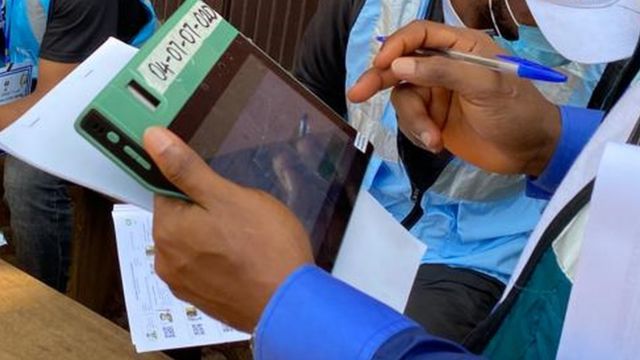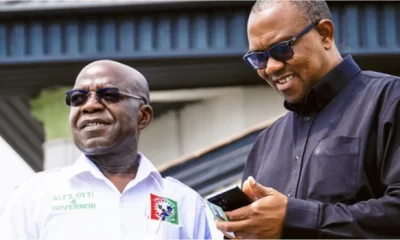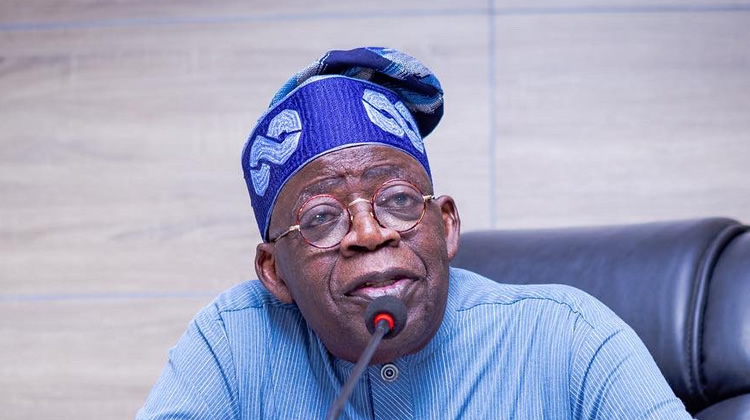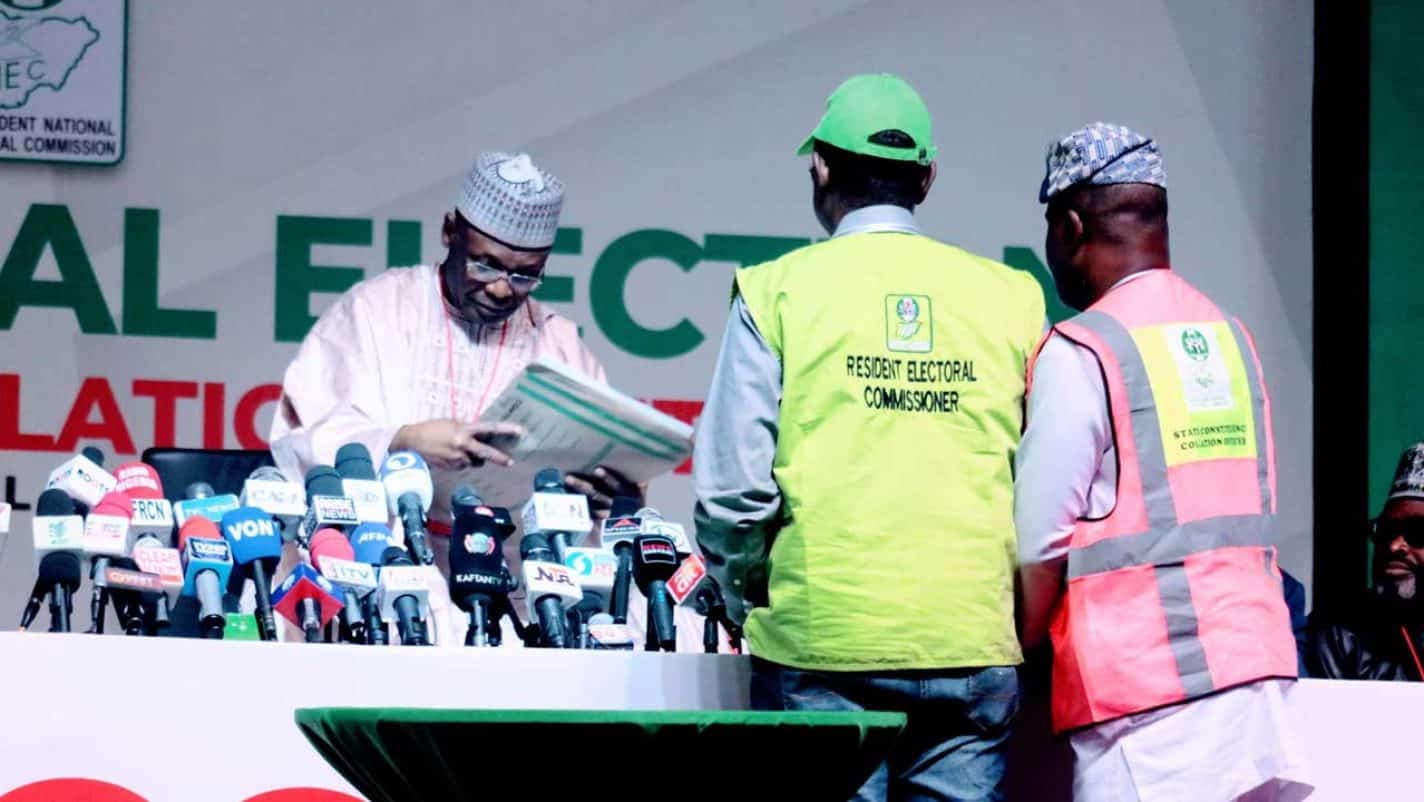2023 Election
PROMAD and policy influencers call on INEC to release the BVAS Report together with the election results.

The Independent National Electoral Commission (INEC) has been asked by two civic tech organizations, PROMAD and Policy Shapers, to publish the full report of the Bimodal Voter Accreditation System (BVAS) nationwide along with the results of the presidential elections.
The results of Saturday’s presidential election, according to a joint statement from the organizations’ founders Daisi Omokungbe and Ebenezar Wikina, indicated Nigeria’s democracy has potential to become more active, participative, and citizen-driven.
However, the civic tech organizations claim that after closely observing and reading the reports of the election, it appears that INEC has not successfully carried out its mandate and commitments to Nigerians as outlined in the 2022 Election Act and the 2023 Electoral Guidelines.
For instance, there are signs of irregularities in the voting procedures around the nation, such as late arrival and the start of the voting process, moving of the collation centers, and failure of the IReV platform.
“We have multiple reports showing that states like Ekiti, Cross River, Imo, and Rivers State have had their Local Government Area (LGA) collation centers relocated without providing proper notice to stakeholders,” claims Connected Development, which deployed 20,000 observers.
“We have reliable information that all LGA collation centers have been moved, specifically in Ekiti. Most of the time, authorized observers were flatly denied entry, and new sites were shrouded in secrecy.
In order to support election openness and integrity in accordance with the Electoral Act of 2022, INEC themselves released a statement on the difficulties they were having with the Election Results Viewing portal (IReV).
(1) A person wanting to vote in an election shall present himself with his voter’s card to a presiding officer for accreditation at the polling place in the constituency in which his name is recorded.
“(2) To cast a ballot, the presiding officer shall utilize a smart card reader or any other technical instrument that the Commission may specify for the accreditation of voters to verify, validate, or authenticate the information provided by the intended voter in the manner specified by the Commission.
(3) If a smart card reader or other technological device used to accredit voters malfunctions in any unit and a new card reader or technological device is not deployed, the election in that unit must be canceled and a new election must be scheduled within 24 hours if the Commission is satisfied that the outcome of the election in that polling unit will significantly affect the overall election’s final outcome and the declaration of a winner.
“Also in Section 51.—”(2) The Presiding Officer shall annul the outcome of the election in any polling unit when the number of votes cast in an election exceeds the number of accredited voters in that polling unit.
“(3) There must be a new election in the polling unit where the election result was canceled, in accordance with subsection (2), before a return for the election can be made.
Part of the statement said, “(4) Despite the requirements of subsections (2) and (3), the Commission may direct that the election be returned if it is satisfied that voting in the area where the election is cancelled will not materially impact the outcome of the election.
The organizations added that INEC must use the BVAS report to check all the results submitted, which were primarily done manually, in order to comply with the requirements of the Electoral Act.
They continued by expressing concern that the statement made by INEC regarding the failure of the IREV stinks of carelessness and is, at best, flimsy from their perspective as civil society organizations. To reduce the consequences of the discovered violations, firm and certain steps must be done.
The organisations encouraged the Commission to take the following actions to increase the transparency and integrity of the election results:
All the BVAS accreditation information from all the polling places where the elections were held, including the number of voters verified by fingerprint and facial recognition, shall be published by INEC without delay.
Around 90% of polling units had BVAS implemented successfully, according to YIAGA. This demonstrates that BVAS data will enhance the results’ integrity and aid in the detection of potential discrepancies.
At this stage of the process, INEC cannot minimize the electronic transfer of results. We kindly request that the Commission restart the IReV platform and carefully review each result uploaded with BVAS data before accepting the results.
Despite holding PVCs and voting, there is no way to make up for the thousands of disenfranchised Nigerians. The integrity of the results and the procedure in the next stages of this election should be protected with top priority, along with a strong public apology to these voters. This is a legal issue, not a matter for discretion.
As evidence of INEC’s accountability and the accuracy of the collation process, all of these must be completed. Remember that Prof. Mahmood Yakubu was reported as saying in October 2022, “Let me once again reassure Nigerians that there is no going back on the deployment of the Bimodal Voter Accreditation System (BVAS) for voter accreditation.
Election Day real-time results transmission to the INEC Result Viewing Portal (IReV) cannot be undone.
The INEC chairman was encouraged by PROMAD and Policy Shapers to act responsibly and uphold his commitment to Nigerians.
They applauded sister organizations, the security apparatus, the media, special representatives, international and local observers, and every Nigerian who is taking part in the effort to defend the country’s democracy and create the Nigeria that is desired by all.






